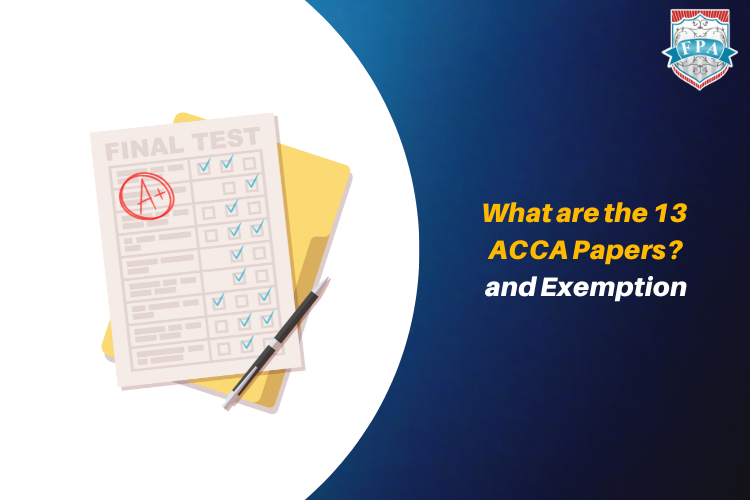The Importance of ACCA Papers: A Deep Dive into Their Significance
The ACCA qualification consists of 13 papers that cover various areas of accounting, finance, and business. These papers serve as a comprehensive framework for aspiring accountants to develop their skills and knowledge in these disciplines. By successfully completing these papers, individuals can gain exemptions from certain ACCA exams, depending on their academic background and qualifications. The ACCA qualification is highly regarded in the accounting and finance industry and provides individuals with the necessary expertise to excel in their careers. Additionally, the ACCA qualification offers opportunities for professional development and networking within the global accounting community. Aspiring accountants can embark on their ACCA journey by starting with the foundational papers and progressing through the more advanced levels as they build their expertise and experience.
What are ACCA Exemptions?
ACCA exemptions refer to the recognition of prior qualifications or relevant experience that exempts individuals from certain ACCA papers. These exemptions allow candidates to skip specific exams based on their previous education or professional background. By granting exemptions, ACCA aims to streamline the qualification process, enabling individuals to focus on the remaining papers required for ACCA certification. This recognition of prior learning can save time and effort for candidates, providing them with a more tailored and efficient path towards becoming a qualified ACCA professional. It is essential for candidates to thoroughly research and understand the ACCA exemption policy to determine if they are eligible for any exemptions. Each exemption is subject to specific criteria, such as the relevance of previous qualifications or professional certifications to the ACCA syllabus. By carefully assessing the exemptions available, candidates can make informed decisions regarding their study plan and exam preparation. Additionally, candidates should note that exemptions are not automatically granted and must be applied for during the registration process. It is worth mentioning that while exemptions can be beneficial, candidates should carefully consider the potential impact on their overall knowledge and understanding. Skipping certain papers may result in a knowledge gap that could affect their ability to master more advanced concepts in later exams. Therefore, candidates should assess their own strengths and weaknesses and consider seeking guidance from ACCA advisors or mentors to ensure a well-rounded understanding of the subject matter.
Pro Tip: When considering ACCA exemptions, take the time to evaluate both the immediate benefits and potential long-term implications on your knowledge and skills development. It’s crucial to strike a balance between efficiency and ensuring a strong foundation for future success.
Unlocking Global Opportunities in Accounting and Finance with ACCA Qualification
➡️ Global CA Certification with Recognition in 180+ Countries
➡️ World’s Oldest and Largest Chartered Accountancy Body
Don’t Wait – Enroll with Us Now and Secure Trending Job Opportunities as a Global ACCA!

Overview of the 13 ACCA Papers
The 13 ACCA papers provide a comprehensive overview of the core topics covered in the ACCA qualification. These papers cover areas such as financial accounting, management accounting, audit and assurance, and taxation, among others. Understanding these papers is crucial for aspiring ACCA professionals as they provide the necessary knowledge and skills required for a successful career in accounting and finance.
Below is an overview of the 13 ACCA papers:
- Paper F1: Accountant in Business
- Paper F2: Management Accounting
- Paper F3: Financial Accounting
- Paper F4: Corporate and Business Law
- Paper F5: Performance Management
- Paper F6: Taxation
- Paper F7: Financial Reporting
- Paper F8: Audit and Assurance
- Paper F9: Financial Management
- Paper P1: Governance, Risk and Ethics
- Paper P2: Corporate Reporting
- Paper P3: Business Analysis
- Paper P4-P7: Advanced papers covering various specialized areas of accounting and finance.
It is important to note that the ACCA offers exemptions for certain papers based on previous qualifications and experience. These exemptions can reduce the number of papers that need to be taken in order to obtain the ACCA qualification.
One interesting fact about the ACCA qualification is that it is recognized globally, with over 208,000 members and 503,000 students worldwide (source: ACCA Global). This highlights the international importance and reputation of the ACCA qualification in the accounting and finance industry.
Conclusion
ACCA Papers – A Comprehensive Guide to Your Success
In the rapidly evolving world of finance, obtaining the right qualifications is essential. The ACCA qualification provides individuals with the necessary knowledge and skills to thrive in this dynamic field. Understanding the 13 ACCA papers and the potential for exemption can be a game-changer for aspiring professionals.
The 13 ACCA papers cover various essential aspects of finance, ranging from financial accounting and management accounting to taxation and audit. By studying these papers, individuals can develop a strong foundation in key areas that are vital to a successful career in finance.
It is important to note that individuals may be eligible for exemptions from some ACCA papers based on their previous educational achievements or professional qualifications. This means that individuals with relevant qualifications may not be required to take certain papers, allowing them to progress more efficiently towards obtaining the ACCA qualification.
A true fact from the source: The ACCA qualification is recognized and respected globally, making it a valuable asset for finance professionals seeking international career opportunities.
Key Takeaways:
- ACCA Exemptions allow candidates to skip certain ACCA papers if they have already completed relevant qualifications or degrees, saving time and effort in the certification process.
- There are 13 ACCA Papers that cover a wide range of subjects including financial accounting, management accounting, taxation, auditing, and financial management, among others. Each paper focuses on a specific area of expertise required for becoming a qualified ACCA professional.
- Understanding the content and requirements of each ACCA Paper is crucial for effective preparation and successful completion of the exams. Candidates should allocate sufficient time to study and practice each paper to ensure a comprehensive understanding and mastery of the subject matter.





